{{currentView.title}}
March 01, 2023
Russian Offensive Campaign Assessment, March 1, 2023
March 1, 6:00 pm ET
Click here to see ISW’s interactive map of the Russian invasion of Ukraine. This map is updated daily alongside the static maps present in this report.
Click here to access ISW’s archive of interactive time-lapse maps of the Russian invasion of Ukraine. These maps complement the static control-of-terrain maps that ISW produces daily by showing a dynamic frontline. ISW will update this time-lapse map archive monthly.
The Kremlin may leverage an amendment to Russia’s Criminal Code increasing punishments for "discrediting" the war in Ukraine to promote further self-censorship among the critical ultranationalist community, prompting pushback from Wagner Group financier Yevgeny Prigozhin and prominent milbloggers. Chairman of the Russian State Duma Vyacheslav Volodin announced on March 1 that the Duma could ratify amendments to the Russian Criminal Code introducing harsher punishments for discrediting participants of the Russian "special military operation," including "volunteers," as soon as March 14.[1] The Russian Ministry of Defense (MoD) labels irregular armed formations fighting in Ukraine—specifically the Wagner Group—as volunteers. Volodin stated punishments would include a fine of up to five million rubles (about $66,450), five years of correctional or forced labor, or a sentence of 15 years in prison.[2] Russian President Vladimir Putin previously stated on February 28 that Russia must "identify and stop illegal activities of those who are trying to weaken [Russian] society" and identify those who "use separatism, nationalism, neo-Nazism as a weapon."[3] Wagner financier Yevgeny Prigozhin has long called on the Kremlin to punish anyone who spoke poorly of Wagner under the guise of ensuring that all participants of the war are protected under existing laws against discrediting the Russian Armed Forces. However, Prigozhin released a suggested adjustment to the amendments in response to Volodin’s statement, arguing the amendment should not punish criticism of senior Russian MoD and Wagner Group commanders.[4] Prigozhin argued constructive criticism "is necessary" to ensure Russian commanders use their powers "transparently and responsibly." Prigozhin may be concerned that the Kremlin could use the expanded amendment to crack down on or, at minimum, promote self-censorship practices among ultranationalist milblogger communities who regularly criticize senior Russian commanders, and likely seeks to balance his desired protection of the Wagner Group with retaining the freedom for himself and friendly milbloggers to criticize the Russian military.
ISW assessed on February 26 that Putin has allowed the ultranationalist community to expand its influence at the expense of the Russian MoD so the Kremlin can leverage the community’s pre-established networks to recruit volunteers.[5] The Kremlin likely seeks to mitigate further pushback from the pro-war ultranationalist community, which continues to look up to Putin as the facilitator of the war despite their criticisms of the conduct of the war. The State Duma will likely pass these amendments on March 14, given Volodin’s announcement. The Kremlin could use these amendments to promote self-censorship among select milbloggers whose constituencies are no longer needed for its force generation or crowdfunding campaigns, or whose criticisms have exceeded the Kremlin’s tolerance for open criticism. It is unclear to what extent such measures would scare Russian milbloggers into self-censorship, however. Former Russian officer (and avid critic of Putin) Igor Girkin mocked Volodin’s announcement, stating that he will start apologizing for his previous critiques of Russia’s military failures and sarcastically retracting his criticism.[6] A Kremlin-affiliated milblogger, however, celebrated the amendments, noting that Putin is attempting to prevent divisions in society to improve the war effort.[7]
A New York Times (NYT) investigation into catastrophic Russian losses during the recent Russian offensive near Vuhledar indicates that the Russian military remains unable to rapidly fix the endemic challenges posed by severe personnel and equipment losses. NYT reported on March 1 that Ukrainian officials reported that Russian forces continued to make serious mistakes and advance tank columns into Ukrainian ambushes in the recent three-week Russian offensive near Vuhledar, which Ukrainian sources characterized as the largest tank battle of the war to date.[8] NYT reported that Russian forces lost at least 130 tanks and armored personnel carriers (APCs) during the three-week offensive, forcing them to resort in the last week to frontal infantry attacks.[9] Ukrainian troops outlined their tactics to NYT, stating they lured Russian forces into kill zones before immobilizing Russian columns and channeling them into mine-laden road shoulders, before destroying them with artillery - including HIMARS, typically used against static, rear area targets.[10] The Russian elements deployed to the Vuhledar area, primarily the 155th Naval Infantry Brigade, are mainly staffed with poorly trained mobilized personnel who suffered massive losses in this area in October 2022 and again in February 2023. ISW previously reported on Russian losses near Vuhledar and assessed that they are emblematic of the Russian military‘s inability to learn from its failures.[11] The NYT investigation supports ISW’s assessment that the continued recreation and reinforcement of Russian military failures will impede the Russian military’s ability to conduct effective offensive operations.[12]
Belarusian President Alexander Lukashenko and Chinese President Xi Jinping signed a package of 16 documents on March 1 that may facilitate Russian sanctions evasion by channeling Chinese aid to Russia through Belarus. The documents include a strategy for joint Belarusian-Chinese industrial development, a document on Belarusian-Chinese scientific and technical cooperation for 2023-2024, and a memorandum of understanding on joint projects using Chinese government loans.[13] Lukashenko stated that Belarus is interested in deepening cooperation with China on technological development, including the creation of joint ventures, the modernization of Belarusian enterprises with modern Chinese technologies, and trade in goods and services.[14] Lukashenko stated that Belarusian manufacturers are interested in studying the "competencies and technologies of Chinese companies in the formation of a component base, the production of engines, transmissions, axles, other components, and assemblies."[15] ISW previously assessed that China may clandestinely transfer military or dual-use equipment to Russia via Belarus.[16]
Lukashenko likely additionally intends these agreements to support his longstanding effort to cultivate Chinese economic influence in Belarus to hedge against Russian integration pressure, although these measures will at most delay Russia’s ongoing campaign to secure full economic control of Belarus. Several of the documents also concern Chinese-Belarusian trade and economic cooperation.[17] Lukashenko previously expressed support to expand China’s economic presence in Belarus in February 2021 when Lukashenko intensified his efforts to delay Russia’s absorption of Belarus through the Union State.[18]
Russian occupation authorities may be attempting to further constrain the International Atomic Energy Agency (IAEA) presence at the Zaporizhzhia Nuclear Power Plant (ZNPP) to compel the de facto recognition of Russian ownership of the plant. The IAEA announced on February 10 that it delayed a planned rotation of personnel to the IAEA mission at the ZNPP due to security concerns.[19] IAEA General Director Rafael Grossi stated on February 20 that the situation remains unstable and on February 28 that 20 detonations occurred near the ZNPP, briefly disconnecting a backup powerline to the ZNPP and underscoring the ZNPP’s "fragile external power situation."[20] Russian Ministry of Foreign Affairs (MFA) Spokesperson Maria Zakharova claimed on February 22 that the UN Department for Safety and Security indefinitely postponed the IAEA personnel rotation without proper cause, claiming that Russia is committed to ensuring the safe passage of IAEA personnel to the ZNPP.[21] Zaporizhia Oblast occupation official Vladimir Rogov claimed on March 1 that Western intelligence agencies disrupted the routine rotation of the IAEA mission in order to accuse Russia of creating obstacles for the IAEA.[22] Russian and occupation officials have previously criticized the IAEA’s presence at the ZNPP, such as Rogov accusing the IAEA in January of playing a political role at the ZNPP to support Ukraine.[23] Russian and occupation authorities likely intend to use either the possibly trapped IAEA personnel or a reduced IAEA presence at the plant to coerce international recognition of Russian ownership over the plant. Russian and occupation authorities may also be attempting to deter a possible future Ukrainian counteroffensive in southern Ukraine by escalating threats to the ZNPP.
Politico reported that Serbian President Aleksandar Vučić is seemingly reconsidering Serbia’s close ties with Russia, spurred in part by ongoing Wagner Group recruitment and subversion efforts in Serbia and demonstrating the international economic and informational costs imposed on Putin by his invasion of Ukraine. Politico reported on March 1 that Vučić seeks to appeal to both Russia and western institutions by continuing Serbia’s European Union membership bid while refusing to impose sanctions against Russia, but Vučić said that Serbia must make "difficult choices" soon.[24] Vučić condemned the Wagner Group and stated that Serbian authorities will arrest all Serbians who have fought for the Wagner Group in Ukraine. Vučić characterized attendees of a Wagner-backed protest in Belgrade as anti-Serbian and paid off by unspecified foreign actors. Vučić greenlit on February 17 a US-led plan to normalize relations with Kosovo, which Serbia does not officially recognize, and stated that Serbia will remain on the path to EU membership. Politico noted that polls in Serbia suggest that more Serbians support Russia than Western states, suggesting Vučić would struggle to completely divest from ties with Russia - which he likely does not intend to do. A Russian milblogger amplified the Politico article and criticized Russian President Vladimir Putin for turning Russia into a "pariah state" from which even "traditional fraternal states distance themselves."[25]
Key Takeaways
- The Kremlin may leverage an amendment to Russia’s Criminal Code increasing punishments for "discrediting" the war in Ukraine to promote further self-censorship measures among the critical ultranationalist community, prompting pushback from Wagner financier Yevgeny Prigozhin and prominent milbloggers.
- A New York Times (NYT) investigation into catastrophic Russian losses during the recent Russian offensive near Vuhledar indicates the Russian military remains unable to rapidly fix the endemic challenges posed by severe personnel and equipment losses.
- Belarusian President Alexander Lukashenko and Chinese President Xi Jinping signed a package of 16 documents that may facilitate Russian sanctions evasion by channeling Chinese aid to Russia through Belarus.
- US officials continue to report that Ukrainian forces are properly using Western-provided weapons in Ukraine.
- Russian and occupation authorities may be attempting to further limit the International Atomic Energy Agency (IAEA) presence at the Zaporizhzhia Nuclear Power Plant (ZNPP) to compel the de facto recognition of Russian ownership of the plant.
- Politico reported that Serbian President Aleksandar Vučić is seemingly reconsidering Serbia’s close ties to Russia during the war in Ukraine, spurred in part by ongoing Wagner Group recruitment and subversion efforts in Serbia.
- Russian forces are fortifying positions on the international border in Belgorod Oblast.
- Russian forces advanced within Bakhmut and continued ground attacks around Bakhmut and in the Avdiivka-Donetsk City area.
- Russian forces continued to conduct offensive operations on the Kupyansk-Svatove-Kreminna line.
- Russian forces continue defensive operations in southern Ukraine.
- Russian occupation authorities continue to struggle with the administrative management of occupied areas.
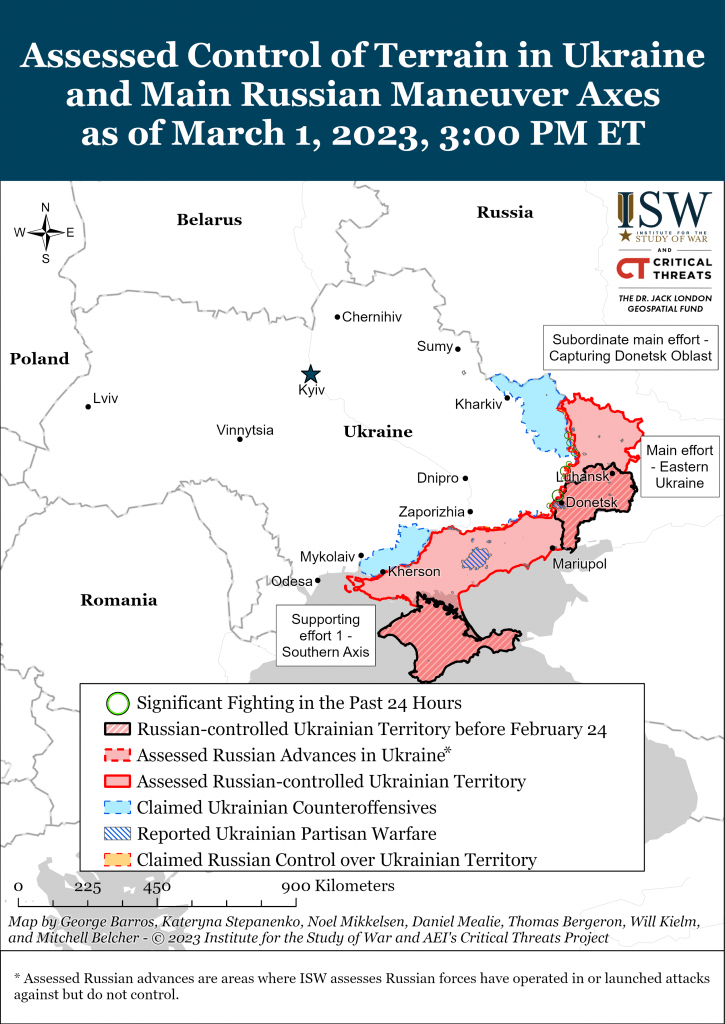
We do not report in detail on Russian war crimes because those activities are well-covered in Western media and do not directly affect the military operations we are assessing and forecasting. We will continue to evaluate and report on the effects of these criminal activities on the Ukrainian military and population and specifically on combat in Ukrainian urban areas. We utterly condemn these Russian violations of the laws of armed conflict, Geneva Conventions, and humanity even though we do not describe them in these reports.
- Russian Main Effort—Eastern Ukraine (comprised of two subordinate main efforts)
- Russian Subordinate Main Effort #1—Capture the remainder of Luhansk Oblast and push westward into eastern Kharkiv Oblast and encircle northern Donetsk Oblast
- Russian Subordinate Main Effort #2—Capture the entirety of Donetsk Oblast
- Russian Supporting Effort—Southern Axis
- Russian Mobilization and Force Generation Efforts
- Activities in Russian-occupied Areas
Russian Main Effort—Eastern Ukraine
Russian Subordinate Main Effort #1— Luhansk Oblast (Russian objective: Capture the remainder of Luhansk Oblast and continue offensive operations into eastern Kharkiv Oblast and northern Donetsk Oblast)
Russian forces are fortifying positions on the international border in Belgorod Oblast. The Ukrainian General Staff reported on March 1 that Russian forces deployed engineering equipment and are installing anti-tank mines in Novostroivka Vtoraya and Gorkovskii, Belgorod Oblast—approximately 47km northwest of Kharkiv City.[26] The Ukrainian General Staff did not observe Russian forces forming offensive groups in the northern Kharkiv Oblast direction, and such fortifications further indicate that Russian forces are not preparing for renewed offensive operations in the area.
Russian forces continued offensive operations on the Kupyansk-Svatove-Kreminna line on March 1. The Russian Ministry of Defense (MoD) claimed that Russian forces repelled three Ukrainian sabotage and reconnaissance groups near Novoselivske (approximately 14km northwest of Svatove) and Tymkivka (about 20km east of Kupyansk).[27] Russian state news outlet Anna News reported that artillery units of the 488th Motorized Rifle Regiment of the 144th Guards Motorized Rifle Division (20th Guards Combined Arms Army) continue to operate on the Svatove-Kreminna line and are supporting Russian assaults against Ukrainian positions.[28] The Ukrainian General Staff reported that Ukrainian forces repelled Russian assaults northwest of Kreminna against Makiivka, Nevske, and Chervonopopivka, and south of Kreminna in Bilohorivka, Shypylivka, and Fedorivka.[29] A Russian news aggregator also claimed that fighting is ongoing in the Makiivka-Balka Zhuravka area.[30] A Kremlin-affiliated milblogger claimed that Ukrainian forces repelled all Russian assaults on Yampolivka, Terny, Nevske, and Makiivka—all within 20km west or northwest of Kreminna.[31] Chechen leader Ramzan Kadyrov claimed that Akhmat special forces, elements of the Luhansk People’s Republic’s 4th Brigade of the 2nd Army Corps, and Russian Airborne Forces (VDV) stormed Ukrainian fortifications in the Kreminna area.[32] A Russian milblogger noted that Ukrainian and Russian forces are fighting for dominant heights in the Kreminna forest area and noted that similar localized battles are ongoing in the Svatove area.[33]
Ukrainian and Russian sources reported that Ukrainian forces struck a Russian ammunition depot in Kadiivka, Luhansk Oblast.[34] Luhansk Oblast Administration Head Serhiy Haidai reported that Russian forces intensified their use of kamikaze drones in the Luhansk direction.[35]
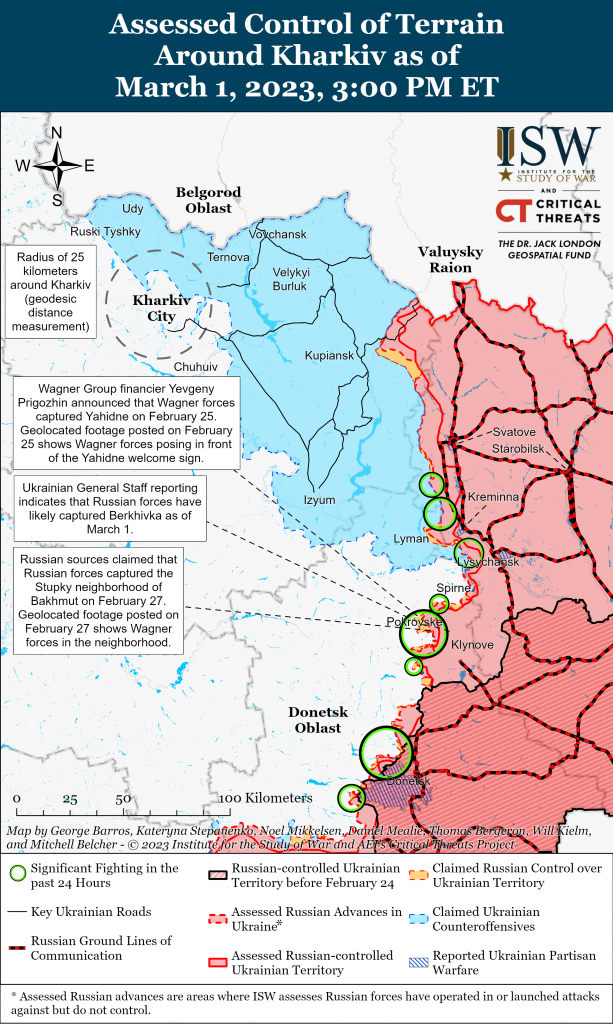
Russian Subordinate Main Effort #2—Donetsk Oblast (Russian objective: Capture the entirety of Donetsk Oblast, the claimed territory of Russia’s proxies in Donbas)
Russian forces conducted ground attacks around Bakhmut on March 1. The Ukrainian General Staff reported that Russian troops continue to advance in the Bakhmut direction and attacked Bakhmut itself; north of Bakhmut near Orikhovo-Vasylivka (10km northwest), Dubovo-Vasylivka (6km northwest), and Bohdanivka (8km northwest); west of Bakhmut near Ivanivske (5km west), Chasiv Yar (10km west), and Khromove (3km west); and southwest of Bakhmut near Bila Hora (15km southwest).[36] Geolocated footage posted on March 1 confirms that Russian forces made advances on the southern outskirts of Bakhmut.[37] Russian milbloggers claimed that Wagner Group fighters have consolidated control of the outskirts of Yahidne (1km northwest of Bakhmut) and are moving southwest towards Khromove, though Ukrainian forces retain access to the Khromove-Bakhmut route.[38] Russian milbloggers additionally claimed that Wagner troops have advanced within Bakhmut near the meat processing plant and up to the bank of the Bakhmutivka River, which runs through eastern Bakhmut.[39] Russian sources continue to claim that Russian troops are attacking Ukrainian positions along the T0504 Kostiatynivka-Chasiv Yar-Bakhmut highway near Ivanivske and that Ukrainian troops are withdrawing from Chasiv Yar.[40] While some Russian sources claim that the situation in Bakhmut is worsening for Ukrainian troops, Wagner Group financier Yevgeny Prigozhin claimed that Ukraine is transferring large numbers of reserves to the area.[41]
Ukrainian officials continue to emphasize that Ukrainian troops have the option to conduct a controlled withdrawal from Bakhmut if they see fit. Ukrainian Presidential Advisor Oleksandr Rodnyanskyi stated on February 28 that Ukrainian forces can strategically pull back from positions in Bakhmut if needed, but that a Ukrainian withdrawal from Bakhmut would not mean that Russian forces would be able to quickly take Bakhmut.[42] Ukrainian President Volodymyr Zelensky previously stated on February 20 that Ukraine will continue to hold Bakhmut, but "not at any cost."[43] ISW has previously assessed that the Ukrainian defense of Bakhmut is a strategically sound operation that will continue to force Russian troops to expend manpower and equipment on costly assaults.[44] Ukrainian officials continue to signal their willingness to strategically delay Russian forces by defending Bakhmut but appear to be assuring the United States and Western partners that they maintain the possibility of a controlled withdrawal if the Ukrainian command deems it necessary.
Russian forces continued ground attacks in the Avdiivka-Donetsk City area on March 1. The Ukrainian General Staff reported that Russian troops conducted unsuccessful offensive actions north of Donetsk City near Avdiivka and Kamianka; on the northwestern outskirts of Donetsk City near Vodyane, Pervomaiske, and Nevelske; and on the southwestern outskirts of Donetsk City near Marinka and Pobieda.[45] Russian sources claimed that Russian forces continue fighting in the Adviivka area near Novobakhmutivka (12km north of Avdiivka) and are trying to break through Ukrainian defenses in Avdiivka from the Opytne-Spartak line to the south.[46] Russian milbloggers additionally claimed that fighting is ongoing within Marinka and that Russian troops have made unspecified gains on the southern and northern outskirts of Marinka.[47]
Russian forces did not conduct any confirmed ground attacks in western Donetsk Oblast on March 1. A Wagner Group-affiliated source posted footage of the 155th Naval Infantry Brigade operating near Vuhledar and claimed that naval infantry elements are trying to gain a foothold near the mine area by Vuhledar to launch further offensives against the settlement.[48] Another Russian milblogger posted footage reportedly of the aftermath of an incident where a Russian tank hit a mine near Vuhledar and its crew crawled into a shell crater to hide from Ukrainian fire.[49] The milblogger claimed that scouts of the 5th Separate Guards Tank Brigade (36th Combined Arms Army, Eastern Military District) and infantry of the 37th Motor Rifle Brigade (36th Combined Arms Army, Eastern Military District) evacuated the wounded tankers.[50] The same milblogger also posted footage of BARS-23 (Russian Combat Reserve) fighters in the Vuhledar area.[51]
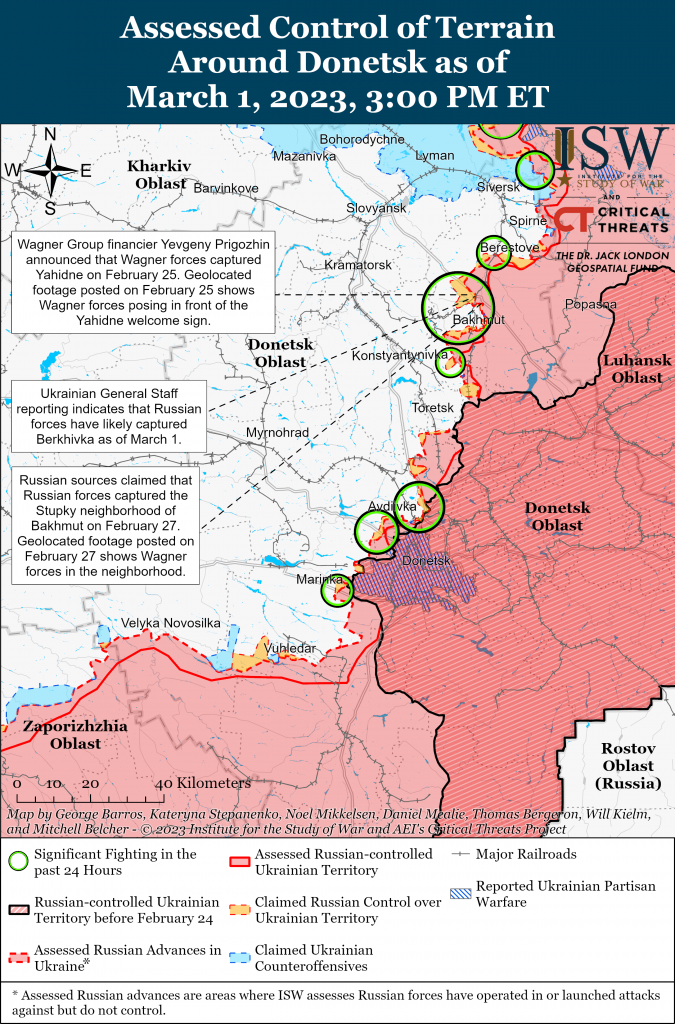
Supporting Effort—Southern Axis (Russian objective: Maintain frontline positions and secure rear areas against Ukrainian strikes)
Russian forces continue defensive operations in southern Ukraine. Head of the Ukrainian Joint Coordination Press Center of the Southern Forces Nataliya Humenyuk stated on March 1 that Russian forces are forming secondary defensive lines in Kherson Oblast in case Russian forces need to withdraw further to the rear in east (left) bank Kherson Oblast.[52] The Ukrainian General Staff reported on March 1 that Russian forces remain on the defensive in southern Ukraine but are attempting to set conditions for future offensive operations, as ISW noted on February 28.[53] Images published on February 28 show new Russian trenches and concrete defenses in an unspecified area of Zaporizhia Oblast.[54]
Ukrainian forces continued to target Russian rear areas in southern Ukraine on March 1. The Russian Ministry of Defense (MoD) claimed that Russian air defenses and electronic warfare systems downed 10 Ukrainian UAVs during a large UAV attack against Crimea.[55] A Russian milblogger claimed that Russian forces downed eight of the drones near Yevpatoria (at the intersection of the R25, T0111, and T0108 highways) and Saky (20km southeast of Yevpatoria along the R25).[56] Ukrainian Mayor of Melitopol Ivan Fedorov reported that Ukrainian forces struck the Melitopol airbase in Zaporizhia Oblast on March 1, and have conducted over a dozen strikes against the airfield since Russian forces first occupied the airbase.[57]
Russian forces continued to conduct routine fire west of Hulyaipole and in Dnipropetrovsk, Kherson, and Mykolaiv Oblasts on March 1.[58]
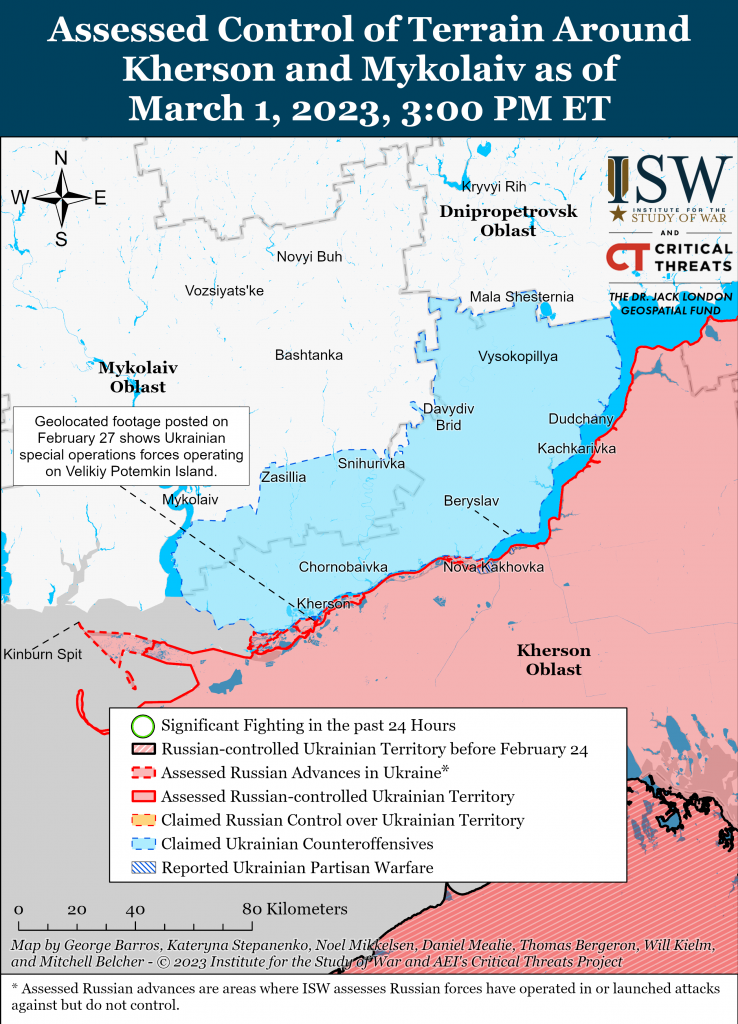
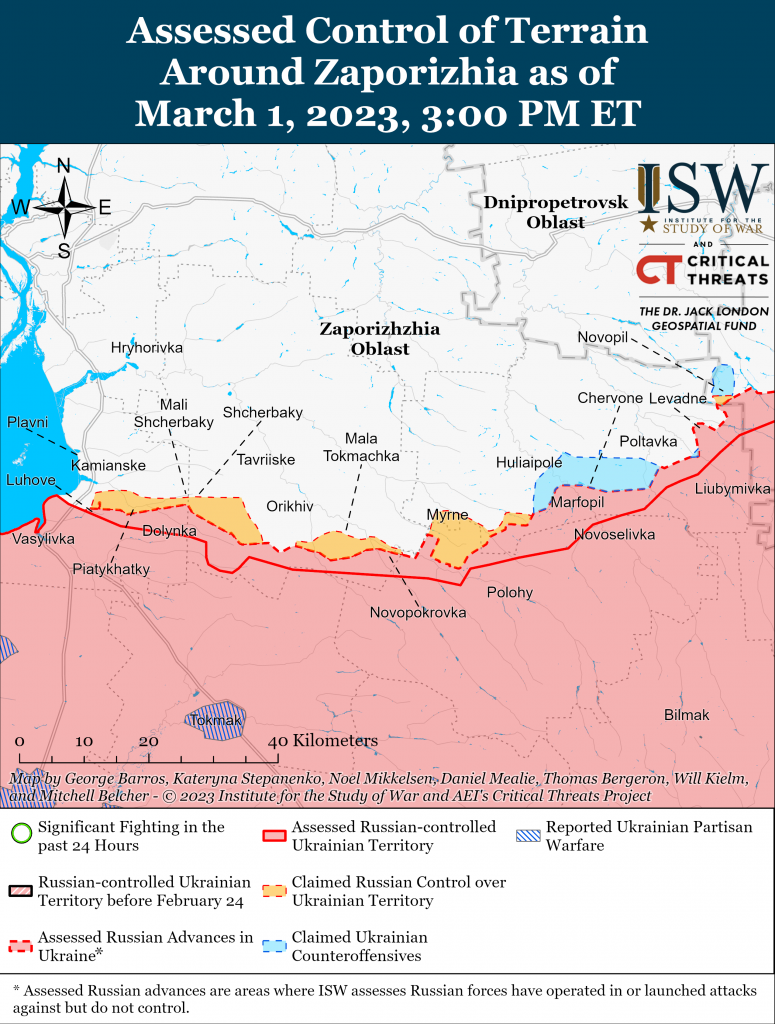
Mobilization and Force Generation Efforts (Russian objective: Expand combat power without conducting general mobilization)
Russian officials continue to claim that Russian defense manufacturers are increasing production amidst ongoing indications that the Russian defense industrial base (DIB) is unable to meet Russia’s long-term economic and military goals. Russian United Shipbuilding Corporation Head Alexey Rakhmanov claimed on February 27 that the company plans to reduce submarine construction time by eight to thirteen months and will complete construction of nuclear submarines due in 2028 a year early.[59] Russian President Vladimir Putin signed a decree on February 27 cutting plans to construct at least three nuclear reactor-equipped Lider class icebreakers by 2035 to produce only one such icebreaker.[60] The war in Ukraine has significantly degraded the Russian military’s stock of conventional military equipment, particularly armored vehicles, and the need to replenish these stocks will likely consume the majority of Russia‘s DIB and limit Russia’s ability to produce systems aimed at longer-term strategic goals, such as nuclear-powered icebreakers.
Russian mobilized personnel continue to publicly criticize Donetsk People’s Republic (DNR) commanders. Mobilized personnel of the 4th company of the 1641st Regiment from Tyumen Oblast directed a video complaint at the Russian Ministry of Defense (MoD) military prosecutor’s office on February 28, stating that DNR commanders transferred them to the frontline without preparation or proper information as to what unit they were subordinated to.[61] Several groups of mobilized personnel have recently released public criticism of DNR commanders and accused them of mistreatment and poor command.[62] ISW assesses that the Russian MoD is likely attempting to integrate some DNR formations into the Russian Armed Forces by subordinating mobilized personnel under these formations, which will likely continue to produce command and control issues.[63]
Chechen Republic Head Ramzan Kadyrov continues efforts to build out military infrastructure in Chechnya to strengthen his parallel military structures. Kadyrov stated that he met with Russian Deputy Defense Minister Timur Ivanov and discussed the construction of military facilities in Chechnya and the deployment of new Russian military units to Chechnya.[64] Kadyrov claimed that Russian officials are currently constructing a 50-hectare military base in Sernovodsk, Chechnya, that is slated for completion by the end of March 2023 and will house newly formed units of the Russian Armed Forces.[65] Kadyrov will likely continue to use Russian military infrastructure in Chechnya to support his parallel military structures, which he deploys to frontline areas in Ukraine to curry favor with the Kremlin and retain in Chechnya itself to maintain his power.
Activity in Russian-occupied Areas (Russian objective: consolidate administrative control of and annexed areas; forcibly integrate Ukrainian civilians into Russian sociocultural, economic, military, and governance systems)
Russian occupation authorities continue to struggle with the administrative management of occupied areas. Donetsk People’s Republic (DNR) Head Denis Pushilin claimed on February 28 that Russian President Vladimir Putin issued guidance on increasing checkpoint capacity to facilitate easy movement between occupied Donetsk Oblast and Rostov Oblast, Russia.[66] Pushilin called for checkpoint throughput to double by April 2023, stating that all three checkpoints will increase their capacity with additional equipment, expanded roads, and additional lanes.[67] Pushilin also noted that there are plans to construct a new checkpoint connecting Ulyanivske, Donetsk Oblast, to Shramko, Rostov Oblast, by an unspecified date.[68] Pushilin’s discussion on improving checkpoints between occupied Donetsk Oblast and Russia suggests that Russian occupation authorities may have not yet identified how to administratively regulate between the Russian mainland and occupied territories, the latter of which should, in theory, be subjected to the same traffic and customs laws as Russia.
Russian occupation authorities continue to coerce residents of occupied areas to apply for Russian passports by tying the provision of social benefits to Russian citizenship. Kherson Oblast Occupation Head Vladimir Saldo stated on March 1 that residents in occupied Kherson and Zaporizhia oblasts can obtain Russian passports under a simplified procedure within a period of no more than ten days.[69] Saldo announced that all 70,000 residents of occupied Kherson Oblast who have received Russian passports as of March 1 will be entitled to social payments according to Russian law, including pension and social programs, family payments, and maternity capital for families with children born after 2007.[70] Saldo claimed that the number of residents of occupied Kherson Oblast with Russian passports will rise to 150,000 in the next two or three months due to the simplified passport issuance procedure, noting that the Russian Internal Ministry has also increased the number of employees working on passport issuance.[71] Saldo announced the goal of issuing 2,000-3,000 passports per day in occupied Kherson Oblast and called for all passportization measures to be completed by the September Russian regional elections.[72]
Russian forces continue to arrest Ukrainian civilians in occupied territories to serve as bargaining chips in prisoner-of-war (PoW) exchanges with Ukraine. Ukrainian Main Military Intelligence Directorate (GUR) Head Kyrylo Budanov stated on February 27 that 40 percent of all Ukrainian PoWs are civilians, including women, students, the elderly, railway workers, and janitors.[73] Budanov stated that Russia captured 90 percent of all PoWs during the first days of the war and currently has more PoWs than Ukraine because of their arrests of civilians. A Kremlin-affiliated milblogger also observed that the number of Ukrainian officer PoWs has decreased throughout the war because of Russia’s inability to conduct operational encirclements of critical parts of Ukrainian territory.[74]
Significant activity in Belarus (ISW assesses that a Russian or Belarusian attack into northern Ukraine in early 2023 is extraordinarily unlikely and has thus restructured this section of the update. It will no longer include counter-indicators for such an offensive.
ISW will continue to report daily observed Russian and Belarusian military activity in Belarus, but these are not indicators that Russian and Belarusian forces are preparing for an imminent attack on Ukraine from Belarus. ISW will revise this text and its assessment if it observes any unambiguous indicators that Russia or Belarus is preparing to attack northern Ukraine.)
Nothing significant to report.
Note: ISW does not receive any classified material from any source, uses only publicly available information, and draws extensively on Russian, Ukrainian, and Western reporting and social media as well as commercially available satellite imagery and other geospatial data as the basis for these reports. References to all sources used are provided in the endnotes of each update.
[1] https://t.me/readovkanews/53794
[2] https://t.me/readovkanews/53794
[3] https://realnoevremya dot ru/news/274568-vladimir-putin-prizval-vyyavlyat-teh-kto-pytaetsya-raskolot-obschestvo; https://t.me/Sladkov_plus/7272; https://t.me/m0sc0wcalling/20541
[4] https://t.me/grey_zone/17495; https://t.me/concordgroup_official/533; https://tass dot ru/obschestvo/16875539; https://t.me/strelkovii/4090; https://t.me/milinfolive/97513; https://t.me/rlz_the_kraken/56746
[5] https://www.understandingwar.org/backgrounder/russian-offensive-campaign-assessment-february-26-2023
[6] https://t.me/strelkovii/4092; https://t.me/strelkovii/4093; https://t.me/strelkovii/4094;
[7] https://t.me/Sladkov_plus/7272
[8] https://www.nytimes.com/2023/03/01/world/europe/ukraine-russia-tanks.html; http://web.archive.org/web/20230301150046/https://www.nytimes.com/2023/03/01/world/europe/ukraine-russia-tanks.html
[9] https://www.nytimes.com/2023/03/01/world/europe/ukraine-russia-tanks.html; http://web.archive.org/web/20230301150046/https://www.nytimes.com/2023/03/01/world/europe/ukraine-russia-tanks.html
[10] https://www.nytimes.com/2023/03/01/world/europe/ukraine-russia-tanks.html; http://web.archive.org/web/20230301150046/https://www.nytimes.com/2023/03/01/world/europe/ukraine-russia-tanks.html
[11] https://isw.pub/UkrWar021323; https://isw.pub/UkrWar021123
[12] https://isw.pub/UkrWar021323
[13] https://www.belta dot by/president/view/lukashenko-i-si-tszinpin-prinjali-zajavlenie-ob-osnovnyh-printsipah-razvitija-obraztsovyh-otnoshenij-553126-2023/; https://aif dot by/politiks/aleksandr_lukashenko_i_si_czinpin_podpisali_celyy_ryad_dokumentov
[14] https://president.gov dot by/ru/events/peregovory-s-predsedatelya-knr-si-czinpinom
[15] https://president.gov dot by/ru/events/peregovory-s-predsedatelya-knr-si-czinpinom
[16] https://understandingwar.org/backgrounder/russian-offensive-campaign-assessment-february-28-2023; https://understandingwar.org/backgrounder/russian-offensive-campaign-assessment-february-27-2023
[17] https://www.belta dot by/president/view/lukashenko-i-si-tszinpin-prinjali-zajavlenie-ob-osnovnyh-printsipah-razvitija-obraztsovyh-otnoshenij-553126-2023/; https://aif dot by/politiks/aleksandr_lukashenko_i_si_czinpin_podpisali_celyy_ryad_dokumentov
[18] https://www.understandingwar.org/backgrounder/belarus-warning-update-forced-integration-russia%E2%80%94not-protest-movement%E2%80%94-lukashenko%E2%80%99s; https://understandingwar.org/backgrounder/russian-offensive-campaign-assessment-january-19-2023
[19] https://www.iaea.org/newscenter/pressreleases/update-146-iaea-director-general-statement-on-situation-in-ukraine;
[20] https://www.iaea.org/newscenter/pressreleases/update-147-iaea-director-general-statement-on-situation-in-ukraine; https://www.iaea.org/newscenter/pressreleases/update-148-iaea-director-general-statement-on-situation-in-ukraine
[21] https://interax dot ru/world/887336
[22] https://ria dot ru/20230301/magate-1855011593.html; https://t.me/vrogov/7924
[23] https://www.understandingwar.org/backgrounder/russian-offensive-campaign-assessment-january-27-2023
[24] https://www.politico.eu/article/serbia-aleksandar-vucic-europe-russia-choice/
[25] https://t.me/m0sc0wcalling/20550
[26] https://www.facebook.com/GeneralStaff.ua/posts/pfbid02P8sbU4VtovKwKEXGmqZ3mhWsXoxpdcNp7VtnpJaTU7bzTvzfqGnCtwD4b5PNaNLxl
[27] https://t.me/mod_russia/24496
[28] https://t.me/anna_news/46975
[29] https://www.facebook.com/watch/?v=855340605565813
[30] https://t.me/readovkanews/53790
[31] https://t.me/wargonzo/11166
[32] https://t.me/RKadyrov_95/3397
[33] https://t.me/miroshnik_r/10663; https://t.me/romagolovanov/10566
[34] https://t.me/luhanskaVTSA/8996 https://t.me/serhiy_hayday/9563; https://t.me/sons_fatherland/10198
[35] https://t.me/luhanskaVTSA/8996 https://t.me/serhiy_hayday/9557
[36] https://www.facebook.com/GeneralStaff.ua/posts/pfbid02P8sbU4VtovKwKEXGmqZ3mhWsXoxpdcNp7VtnpJaTU7bzTvzfqGnCtwD4b5PNaNLxl; https://www.facebook.com/watch/?v=855340605565813
[37] https://twitter.com/auditor_ya/status/1630908538233970689 ; https://twitter.com/GirkinGirkin/status/1630795516668674049
[38] https://t.me/rybar/44088; https://t.me/boris_rozhin/79382; https://t.me/readovkanews/53790
[39] https://t.me/rybar/44088; https://t.me/boris_rozhin/79382; https://t.me/readovkanews/53790
[40] https://t.me/rybar/44088; https://t.me/NeoficialniyBeZsonoV/22778; https://t.me/rustroyka1945/9059
[41] https://t.me/readovkanews/53818; https://twitter.com/wartranslated/status/1630908175892316160
[42] https://edition.cnn.com/europe/live-news/russia-ukraine-war-news-02-28-23/h_866ba859233f019a717d983f81f89c4e
[43] https://isw.pub/UkrWar022023
[44] https://isw.pub/UkrWar021423
[45] https://www.facebook.com/watch/?v=855340605565813; https://www.facebook.com/GeneralStaff.ua/posts/pfbid02P8sbU4VtovKwKEXGmqZ3mhWsXoxpdcNp7VtnpJaTU7bzTvzfqGnCtwD4b5PNaNLxl
[46] https://t.me/readovkanews/53790; https://t.me/wargonzo/11166
[47] https://t.me/wargonzo/11166
[48] https://t.me/grey_zone/17488
[49] https://t.me/boris_rozhin/79399; https://t.me/zhivoff/8311
[50] https://t.me/boris_rozhin/79399; https://t.me/zhivoff/8311
[51] https://t.me/boris_rozhin/79377
[52] https://armyinform dot com.ua/2023/03/01/dlya-chogo-okupanty-oblashtovuyut-novi-pozycziyi-u-svoyemu-glybokomu-tylu-na-livoberezhzhi-hersonshhyny/
[53] https://www.facebook.com/watch/?v=855340605565813; https://www.facebook.com/GeneralStaff.ua/posts/pfbid02P8sbU4VtovKwKEXGmqZ3mhWsXoxpdcNp7VtnpJaTU7bzTvzfqGnCtwD4b5PNaNLxl; https://www.understandingwar.org/backgrounder/russian-offensive-campaign-assessment-february-28-2023
[54] https://twitter.com/Militarylandnet/status/1630635796481884165?s=20
[55] https://t.me/mod_russia/24497
[56] https://t.me/rybar/44104
[57] https://www.rbc dot ua/rus/news/spetstribunal-rf-mozhna-stvoriti-zavtra-bulo-1677684490.html; https://t.me/hueviyherson/35679
[58] https://www.facebook.com/GeneralStaff.ua/posts/pfbid02P8sbU4VtovKwKEXGmqZ3mhWsXoxpdcNp7VtnpJaTU7bzTvzfqGnCtwD4b5PNaNLxl; https://www.facebook.com/watch/?v=855340605565813; https://t.me/mod_russia/24496; https://t.me/rybar/44098; https://t.me/khersonskaODA/4051; https://t.me/khersonskaODA/4057; https://t.me/khersonskaODA/4059; https://t.me/mykolaivskaODA/4415; https://t.me/zoda_gov_ua/17099; https://t.me/Yevtushenko_E/2702
[59] https://ria dot ru/20230227/rakhmanov-1854528981.html
[60] https://thebarentsobserver.com/en/2023/03/moscow-lowers-ambitions-nuclear-icebreaker-program-will-not-build-fleet-new-super-powerful; http://static.kremlin dot ru/media/events/files/ru/vzuAP2g7SDX1vxddR5G6V6AfwhGAVrtQ.pdf
[61] https://t.me/mobilizationnews/9436
[62] https://twitter.com/666_mancer/status/1629747521365966850;%C2%A0https://t.me/Baikal_People/2025 ; https://isw.pub/UkrWar020823
[63] https://isw.pub/UkrWar020823 ; https://isw.pub/UkrWar022023
[64] https://t.me/RKadyrov_95/3396
[65] https://t.me/RKadyrov_95/3396
[66] https://t.me/pushilindenis/3220
[67] https://t.me/pushilindenis/3220
[68] https://t.me/pushilindenis/3220
[69] https://t.me/SALDO_VGA/500; https://t.me/SALDO_VGA/501
[70] https://t.me/SALDO_VGA/500
[71] https://t.me/SALDO_VGA/500
[72] https://t.me/SALDO_VGA/500; https://t.me/SALDO_VGA/501
[73] https://armyinform dot com.ua/2023/03/01/kyrylo-budanov-ponad-40-tyh-kogo-rosiya-utrymuye-v-zaruchnykah-czyvilni-lyudy/; https://koordshtab dot gov.ua/archive/1086; https://ukrainian.voanews.com/a/6980458.html
